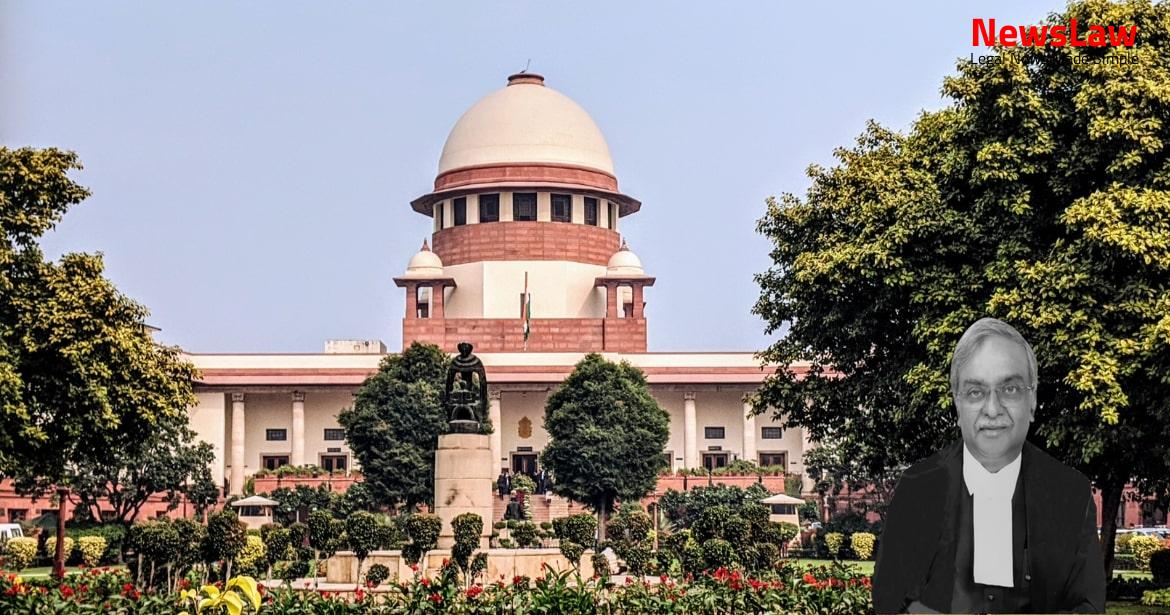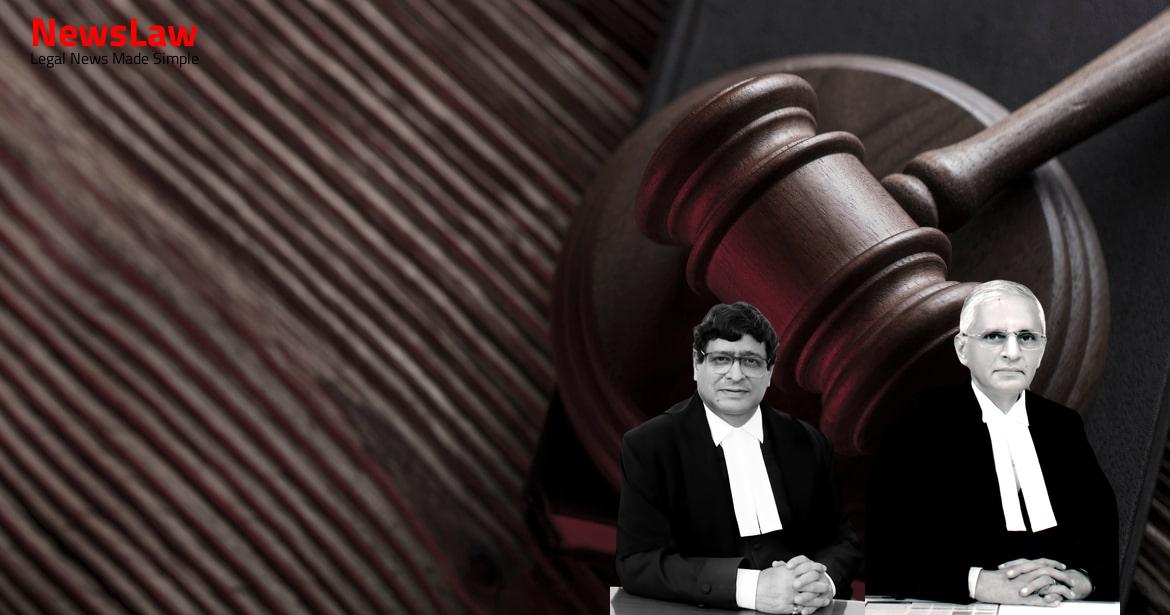Delve into a comprehensive examination of the court’s legal analysis in a notable specific performance case. The focus is on the court’s interpretation of key legal provisions such as Section 16(c) of the Specific Relief Act, readiness and willingness of the parties, and the discretionary aspect of granting specific relief. This analysis sheds light on the intricate legal reasoning applied by the court in reaching its judgment.
Facts
- The original plaintiff is aggrieved by the High Court’s decision to quash the judgment and decree for specific performance of the Agreement.
- The trial court ruled in favor of the plaintiff on issues 1 and 2 against the defendants.
- The time period for the agreement was extended twice at the vendor’s request.
- Defendant Nos.2 to 5, who later received the sale deed, were also parties in the case.
- The agreement was for the sale of land for Rs. 56,000, with Rs. 25,000 received initially.
- Defendants contested the existence of the agreement and subsequent extension documents.
- A sale deed was executed in favor of defendants 2 to 5 despite receiving part of the sale consideration and the agreement to sell.
- The plaintiff alleged that defendants 2 to 5 were aware of the agreement but still obtained a sale deed fraudulently.
- Witnesses and documentary evidence were presented by the defendants during the case.
- The High Court set aside the judgment and order passed by the First Appellate Court and remanded the matter to the First Appellate Court for decision afresh on specific issues related to readiness and willingness of the plaintiff.
- The High Court raised concerns regarding non-compliance with Section 16(c) of the Specific Relief Act and the effect of non-registration of documents for extending time to execute the sale deed.
- The High Court allowed the appeal by the original defendants, quashed the concurrent findings of the lower courts, and reversed the judgment and decree of specific performance mainly due to lack of specific averments in the plaint.
- Both the Trial Court and the First Appellate Court had ruled in favor of the plaintiff on various issues including readiness and willingness, but the High Court reversed these findings under Section 100 of the CPC.
- The Trial Court decreed the suit for specific performance, directing the defendant to execute the sale deed within two months after fulfilling specified conditions.
- The plaintiff filed an execution case when the defendants did not comply with the judgment and decree, leading to further legal proceedings and appeals.
- Upon remand, the First Appellate Court reconsidered the issues and ultimately dismissed the appeal by the original defendants, confirming the Trial Court’s judgment and decree.
Also Read: Legal Analysis on Conviction Based on Sole Testimony of Prosecutrix
Issue
- Plaintiff paid additional amounts on two separate dates after the initial advance payment.
- Trial Court framed several issues including the execution of the agreement to sell by defendant No.1.
- Plaintiff’s readiness and willingness to execute the sale deed according to the agreement was questioned in the issues framed by the Trial Court.
- Validity of the defendants (Nos. 2 to 5) as bona fide purchasers without notice of the agreement was also an issue.
- The Trial Court sought clarification on the effect if the defendants were indeed bona fide purchasers.
Also Read: Legal Analysis on Concurrent Sentences in Drug Trafficking Cases
Arguments
- High Court rightly drew a distinction between readiness and willingness and provided cogent reasons on the same.
- Section 20 of the Act is argued to be inapplicable in the circumstances of the case.
- Non-compliance of Section 16(c) of the Act is contested.
- High Court’s interpretation on the discretionary nature of granting specific relief is challenged.
- Ready and willing performance by the plaintiff is emphasized, with reference to payment details and attempts to execute the sale deed.
- Contention raised against High Court’s observation on the discretionary nature of decree for specific performance under Section 20 of the Act.
- Opposition to High Court’s decision on non-suiting the plaintiff based on proviso to Section 20 of the Act.
- Readiness and willingness as pleaded in the plaint are defended, citing specific paragraphs and overall spirit of the suit.
- Defendant’s conduct and payment details are argued to support the plaintiff’s claim for specific performance.
- Emphasis on exercising discretion soundly and reasonably in granting specific relief.
- Challenge to High Court’s reasoning on non-compliance of Section 16(c) of the Act as fatal and determinative for decree of specific performance.
- Opposition to setting aside concurrent findings of both lower courts on readiness and willingness by the High Court.
- As per the submission, defendant Nos. 2 to 5 deposited Rs.1,24,135 on 11.10.2010 following the High Court’s directions.
- The plaintiff refused to accept the money deposited by the defendants.
- The High Court ordered the transferees to refund Rs.40,000 to the plaintiff with 8% interest from 23.06.1984 until the payment they made.
- The agreement to sell was executed on 10.10.1976, making it over 45 years since then.
- The defendants have been in possession of the land for many years, causing potential undue hardships if they are to vacate the land.
- The defendants request consideration of Section 20 of the Act to avoid causing undue hardships.
Also Read: Legal Jurisdiction and Award Finality in Arbitration Dispute
Analysis
- The plaintiff filed a suit for specific performance of an agreement to sell dated 10.10.1976.
- The defendant No.1, who is the father-in-law of the plaintiff, requested extensions of time for execution due to various reasons, such as clearing a bank loan.
- Concurrent findings showed defendant Nos. 2-5 were aware of the agreement in favor of the plaintiff and purchased the land illicitly.
- The plaintiff had paid a total of Rs.40,000 out of Rs.56,000 agreed upon for the land.
- The High Court’s observation on Section 20 of the Act, regarding discretionary relief, was not accepted or approved.
- The plaintiff showed readiness and willingness to perform their part of the agreement.
- The High Court’s emphasis on technicalities in pleading requirements was considered unnecessary.
- The absence of specific phraseology in Section 16(c) was highlighted, emphasizing substance over form in pleading requirements.
- Readiness and willingness of the plaintiff were consistently proven through payments and agreement extensions.
- The Court considered the conduct of the parties and the plaintiff’s actions in good faith throughout the proceedings.
- The High Court’s interference with findings of fact on readiness and willingness was deemed unwarranted unless found to be perverse.
- The need for a holistic interpretation of pleadings and the essence behind the plea was emphasized.
- Amendment in the Specific Relief Act regarding discretionary relief was mentioned as a guiding factor.
- The plaintiff’s continuous readiness and willingness to execute the sale deed were reasserted, despite technical discrepancies in pleadings.
- The Court pointed out that the balance of discretion should favor the plaintiff in the case of agreement breaches by the defendants.
- Extensions of time and payments made by the plaintiff were placed in the context of their willingness to fulfill their contractual obligations.
- The High Court’s critique of compliance with Section 16(c) was rebutted by the presence of necessary averments in the plaint.
- The plaintiff’s accommodating approach towards the defendant No.1, the father-in-law, was highlighted as a factor in the case.
- Technicalities in specific language requirements of pleading were downplayed in favor of substantial compliance with the spirit of the law.
- In the case of C.S. Venkatesh Vs A.S.C. Murthy, the court held that the plaintiff’s readiness and willingness to perform his part of the contract can be inferred from the facts and circumstances of a particular case.
- It is important to consider whether the plaintiff was ready and willing to perform his obligations under the contract.
- The plaintiff’s readiness and willingness can be determined based on the specific facts and circumstances of the case.
- The balance must tilt in favor of the plaintiff due to the long duration of the litigation.
- The plaintiff has been deprived of possession for many years as a result of the ongoing legal process.
- This deprivation of possession justifies a ruling in favor of the plaintiff.
Decision
- The decree passed by the learned trial Court on 07.02.1987 is upheld.
- The High Court’s judgment and order dated 09.09.2010 in Second Appeal No.836/2010 is quashed and set aside.
- The suit is decreed for specific performance of the agreement to sell dated 10.10.1976 in favor of the plaintiff.
- The defendants, including heirs and legal representatives of defendant No.1, are directed to execute the sale deed in favor of the plaintiff within four weeks.
- The defendants are also instructed to hand over peaceful and vacant possession of the suit land to the plaintiff within four weeks.
- The appeal is allowed with no costs.
Case Title: SUGHAR SINGH Vs. HARI SINGH (DEAD) THROUGH LRS. (2021 INSC 672)
Case Number: C.A. No.-005110-005110 / 2021



